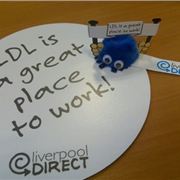SURPLUS Liverpool City Council computers are to be wiped clean and handed out to city residents.
The Mayoral Cabinet has approved plans to commit funding from the Mayoral Development Fund to “refresh” around 400 council PCs which are no longer in use, so they can be given to local people and community and voluntary groups.
The scheme, says the council, aims to “bridge the technology divide”, and respond to the difficult economic climate by ensuring cash-strapped residents are not excluded from the increasingly important need to access the internet. It also aims to give local people the tools to gain vital IT skills, including the use of word processor packages.
Mayor of Liverpool, Joe Anderson, said: “The majority of us take PC ownership and internet access for granted, but for many of our most vulnerable residents, it’s a luxury they cannot afford.
'Potential'
He said the scheme was “about making the best use of our assets and resources to support and protect our most vulnerable residents. It’s also about investing in people of all ages, so they can improve their quality of life, learn new skills, raise their educational attainment and reach their full potential.”
Under the plans, 100 PCs will be issued to the Liverpool Community Voluntary Sector (LCVS) to distribute to clients as appropriate.
The remaining 300 PCs will be distributed to local people by the council’s Community Services team, supported by ward councillors, on a case-by-case basis. Further information on how to apply for a PC will be provided to local people in the near future.
The PCs will include Windows 7, Microsoft Office, and internet-access packages. As part of the refresh process, all PCs will be ‘wiped clean’ before being distributed, to protect all important and sensitive data.
The roll-out of the scheme will begin immediately, with all PCs expected to be distributed by the end of the year.
Easy PC
Liverpool City Council and its computers have made headlines of their own in the past, so who knows, you could be getting your hands on a piece of history.
In 2010, the council's own probe revealed that the city was being overcharged £10m a year by BT, in its ongoing contract with Liverpool Direct Ltd, for its controversial IT and call handling operation.
Investigators said support charges for PC printer and scanning were £1m a year too high.
The probe also found that benchmarking desktop and laptop prices suggested they were marked up by between 93pc and 149pc in comparison with alternative suppliers.

At the start of the contract, the council was paying £3m for added extras, such as additional computers and services, a figure which, in 2010, stood at £13.4m.
Before that council PCs and emails were at the centre of "Cabal-gate" the big public fallout between former city council leader Mike Storey and the then chief executive, David Henshaw.
But that was in 2005 in the days before iPads and plasma screens. Such computers are now probably sitting in a graveyard somewhere, along with the careers of many of the people involved.










